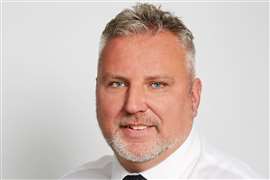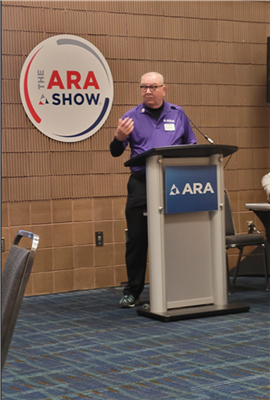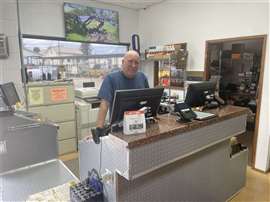10 ‘food for thought’ quotes on equipment rental in 2024
15 August 2024
As we’ve rounded the corner into the second half of the year, let’s take a look back at statements made by leaders in the equipment rental industry since the start of 2024.
This is not an exhaustive list, but these quotes provide wisdom, and food for thought on the direction the industry is headed in.
1. ‘The runway for growth in specialty is very long’ - Kyle Horgan, Sunbelt Rentals
In its ‘Sunbelt 4.0’ plan, growth of specialty rental is among the primary objectives for Sunbelt Rentals. This includes 12 distinct lines: power and HVAC at the top, with a plan for scale growth approaching $1.9 billion at the end of 4.0, all the way down to the newest line - temporary walls - with a plan reaching roughly $50 million in scale over the same period.
Kyle Horgan, SVP of business development, said, “If you sum all of these up, we have a plan that can add $2 billion over the 4.0 period, resulting in a specialty business that reaches $5 billion through the end of the period.”
Ashtead’s specialty businesses, which include power & HVAC and flooring solutions, grew by 14% for the 2024 financial year.
“We know rental penetration in this space is still comparatively low versus the broader general tool and equipment landscape,” he says. “We know the runway for growth in specialty is very long.
“We added three distinctly new lines over the 3.0 period: temporary structures, temporary fencing and temporary walls. All are essentially in their infancy, with lots of growth ahead. We know there’s opportunity for more.”
2. ‘Inflation is the biggest concern’ - Mike Disser, RMC Consults LLC
Market indicators have been calling for growth in the US rental market in 2024, and so far, results have exceeded expectations, but that doesn’t mean there aren’t challenges.
“One of the biggest obstacles that rental companies’ face has to do with achieving acceptable returns on their fleet,” says Mike Disser with RMC Consults LLC. “With rapidly rising equipment, operational and employee costs, rental companies will be forced to raise rental rates to their customers and must be able to explain it to them in an acceptable manner, without losing them.”
He continues, “Inflation is the biggest concern. Costs are rising at a pace not seen previously, which are difficult to absorb and/or pass along to customers.”
3. ‘Culture eats strategy for breakfast’ - Andy Wright, Vital Power Group
 Andy Wright, executive chair of Coventry-based power specialist Vital Power Group
Andy Wright, executive chair of Coventry-based power specialist Vital Power Group
“The words in the above title were attributed to globally respected management guru Peter Drucker, and although there is some debate as to whether he did say these words, if we imagine that he did, what did he mean by them?”
This question was poised by Andy Wright, executive chair of Coventry-based power specialist Vital Power Group and IRN columnist, in his latest piece.
“I don’t think that he was saying that having a strategy is unimportant or a secondary consideration, rather that a strong and positive culture was the best way to guarantee success in business over the long term, as teams that are fully aligned and believe in what they are jointly trying to achieve and why they are doing it can overcome any and all challenges.
“People with different backgrounds and personalities, who may not at first viewing be an obvious choice for the role, can be awesome at doing the job that needs to be done and it’s only through probing beneath the surface that we can get a true view of the cultural match.
“To achieve this, we need to get beneath the superficial level of CVs, engage a range of managers in the hiring process, to get a fully rounded view of the person, and it’s helpful to ‘always be in a recruiting’ mindset.”
4. ‘Looking for purpose more than a job’ - Thibault Itzel, Genie
Shaped by social media, the pandemic and big tech, Gen Zs are entering the jobs market. But what do they want from their jobs and what effect are these demands having on the construction and rental industries?
Perhaps more than anything, beyond providing good pay and conditions, Gen Z wants to have a sense of purpose from a job which goes beyond just earning money.
“The new generation is mostly looking for purpose more than a job,” says Thibault Itzel, a sales person at Genie. “They’re looking at the company values hoping they match their personal values. And of course, they’re looking at the company’s websites and social media posts as well. And they do ask those kinds of questions during job interviews. What kind of social project are you working on as a company? Are you volunteering somewhere? Do you have sustainability actions? It’s definitely something new.”
5. ‘Labor intense regardless of the impact of the AI’ - Joel Särkkä, Renta Group
AI or machine learning can help businesses by becoming more productive, but even so, rental will remain a labor-intensive business, says Joel Särkkä, chief information officer at Finland-based Renta Group.
 Joel Särkkä, chief information officer of Renta Group, speaking at the IPAF Summit in Copenhagen in March 2024. (Photo: www.photographybymatthewjames.com)
Joel Särkkä, chief information officer of Renta Group, speaking at the IPAF Summit in Copenhagen in March 2024. (Photo: www.photographybymatthewjames.com)
“Even though machine learning will tell us when the service happened, we still have to service the machine. We still need to install the telematics unit and we still have to erect the scaffold or move the site hut. It’s a very labor intense regardless of the impact of the AI,” he says.
And the problem is likely to get worse; “Our aging pyramid is not really looking like a pyramid anymore. We can expect that the labour shortage is not going to get any easier soon. We have more and more experienced employees and obviously they’ll be going into retirement. So, we will have to attract more employees from a broader talent pool.”
Särkkä thinks rental businesses will have to draw from a broader cohort; “We have to make the workplace more inviting, whatever those activities may be that we need to put in place to show that we are an attractive employer and then communicate about the highlights of our industry.”
6. ‘The big guys will get bigger’ - Kevin Fitzgerald, REIC
On the future of the rental industry, Kevin Fitzgerald, executive chairman, REIC, says he thinks consolidation will continue among the top five to 10 companies.
“The big guys will get bigger and bigger, and then there will be a bunch of us after that, and we will also get bigger and bigger,” he says.
“Capital is the key growth driver now. The big guys have it, but a lot of companies do not. They’re individually owned, and they just don’t have the capital...
“The levers that we have to control capital are very good, and I think the public markets have figured this out. Coupled with the fact that the big guys are in so many industrial businesses now, not as much tied to construction, these factors are making the industry trade higher.”
He continues, “Five years from now, I think the industry will continue to trade higher, and the big guys will get bigger. There will continue to be Mom and Pops springing up all over the place. It’s all because the demand is there, and we’re still only at around 55% rental penetration in the U.S.”
7. ‘More than half of equipment in the US is rented’ - John McClelland, American Rental Association
At the ARA Show in February, the American Rental Association reported that rental penetration, which is a measure of how much equipment deployed in the marketplace is rented, has reached 56.4%, near the pre-pandemic peak.
“More than half of the equipment that’s out there in the United States is rental equipment,” said John McClelland, Ph.D., ARA vice president for government affairs and chief economist, noting that the ARA’s Rental Penetration Index reached an all-time high of 56.7% in 2019, before dipping to 51.5% the following year due to pandemic-related challenges.
Josh Nickell, ARA vice president of equipment rental, told Rental Briefing late last year that the relationship between uncertainty and rental penetration is never a straight line.
 John McClelland, Ph.D., ARA vice president for government affairs and chief economist, speaking at the ARA Show in February, 2024.
John McClelland, Ph.D., ARA vice president for government affairs and chief economist, speaking at the ARA Show in February, 2024.
“Any time there’s a shock to the system, like in 2008 or during Covid, we typically see a huge initial drop in rental penetration,” he explained. “Say you’re a construction company with a mixed fleet of owned and rented equipment, and suddenly, things slow down. What fleet disappears first?
“Contractors don’t sell their owned equipment immediately, they stop renting. But the next time they need equipment, they tend to rent vs. buy. Rental penetration then recovers and typically exceeds the previous drop.”
8. ‘We’re looking to offer a bundle of jobsite services’ - Scott Cannon, BigRentz
Scott Cannon, CEO of BigRentz, says the rental industry is in relatively good shape.
“Within the last couple of years, there’s been an issue with availability of equipment, because Covid really put a hammer on the supply chain,” he states. “But there’s been pretty good growth over the last couple of years, and there are tailwinds. There’s a lot of government money and infrastructure projects that are going to roll out over the next several years, so rental penetration will continue to grow. In this day and age, it just makes sense not to own equipment.
“But there are broader issues with staffing, and having appropriate tradesmen. There are a lot of folks retiring in the next 15 years, and there’s a gap where everybody was told to go to college and didn’t learn how to work trades. That’s really going to put a strain on our industry. And material costs have been a really big variable over the last couple of years.”
Cannon continues, “We’re trying to be a solution for our companies. They need to get materials, they need to get equipment, and they need to get tradesmen. If you look at it together, I would say we’re looking to offer a bundle of jobsite services. That would be the direction of the company, long term.”
9. ‘Finding trained help is not possible’ - Dave Dworschak, Don’s Rental
Dave Dworschak, owner and president, Don’s Rental, Saint Helens, Oregon, in the US, says the success that corporate rental chains are experiencing this year is not indicative of what smaller companies are seeing.
“If you read the quarterly reports of corporate rental chains like United Rentals, or the regular industry forecasts from the American Rental Association, you’d likely form the opinion that rental is in for another year of growth in the US, followed by several more. While good news for anyone with a stake in the industry, it’s not a unanimous characterization. In fact, for smaller independents in markets outside of growing cities, it can be downright tough,” he says.
One of the challenges is staffing.
“Finding trained help is not possible, not in the rental business,” he states. “You have to train anybody and everybody, and that takes time and investment. The old business buzzwords of getting lean and getting
 Dave Dworschak, owner and president, Don’s Rental, Saint Helens, Oregon, in the US
Dave Dworschak, owner and president, Don’s Rental, Saint Helens, Oregon, in the US
mean apply.”
10. ‘The rental industry itself is intrinsically sustainable’ - Amelia Woodley, Speedy Hire
According to Amelia Woodley, ESG director, Speedy Hire, the construction industry makes up nearly 40% of global emissions (United Nations Environment Program, 2023) and the rental sector plays an important role in helping industry decarbonize as it plays a key part when looking at the bigger picture.
“Where the focus was previously on decarbonizing large-scale elements such as steel and concrete, the industry is now looking at plant and the equipment and how this can be made more sustainable,” she says. “Here, the hire industry has the opportunity to leverage its strong credentials in sustainability and demonstrate leadership.
“It is important to highlight that the rental industry itself is intrinsically sustainable. Circularity is at the heart of industry, reflected in the core practice of renting an item and returning it rather than making a single-use purchase, whether it be on a personal or business level.”
She concludes, “This model by its very design promotes sustainability and the circular economy, which is also recognized by the investor market as being a crucial tenet of the pathway to net zero. Without the circular economy, there is no pathway. As a result, the hire industry has a huge role to play.”
STAY CONNECTED



Receive the information you need when you need it through our world-leading magazines, newsletters and daily briefings.
CONNECT WITH THE TEAM







